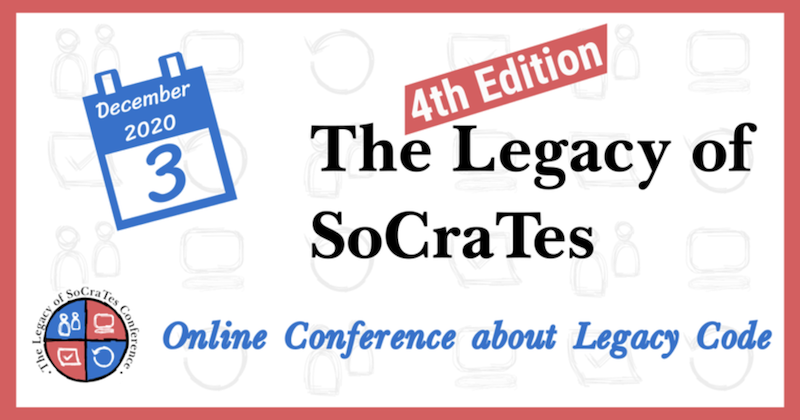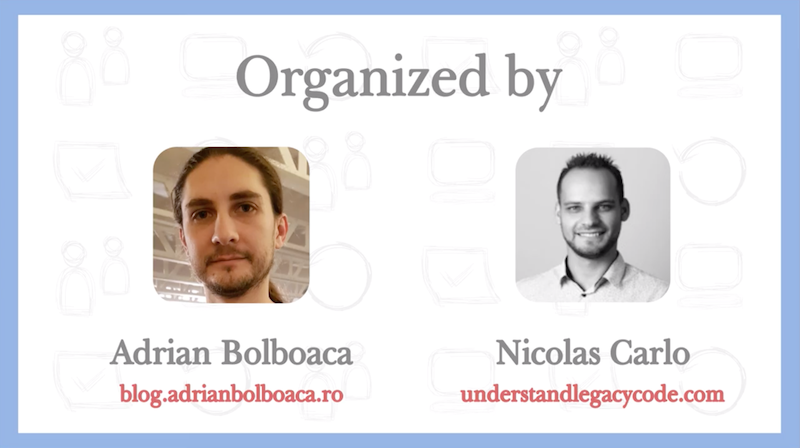Refactoring, Unit Tests, and Symmathesy
⛑️️ My First Aid Kit can help you rescue any codebase quickly and safely!
On December 3, 2020, I co-organized the 4th edition of The Legacy of SoCraTes with my partner in crime Adrian Bolboacă.
It’s a half-a-day remote conference where 5 speakers share their tips to deal with Legacy Code.


This edition focused on changing existing code incrementally, slowly migrating towards a better codebase. Refactoring was certainly the main keyword here!
We also tried something different and had a roundtable discussion with Jessica Kerr, instead of a formal talk. More on that below 👇
As usual, we recorded all the talks so you can watch them now and share them with your teammates! Let’s see what great talks this edition had…
Refactoring like a Zen master
Bastien David and Rémy Sanlaville paired on this one to present you with a brand new refactoring kata.
They used this kata to demonstrate how they would refactor some legacy code together.
I particularly love the dynamic between the 2 developers. Although it’s a talk, they tried not to practice too much in advance so they’d keep a fresh eye on this code. The end result is insightful. The pace is a bit slower than a regular talk, but the content is much more authentic.
I’d recommend you watch this one in multiple 10-15min shots to get most of it:
If you want to practice on the same kata, here it is: github.com/SoftwareCraftsmanshipGrenoble/elections
If you are looking for more coding exercises to work on Legacy Code, I’ve compiled a list for you.
Refactoring Large Objects with the Strangler Fig pattern
I love this one.
First of all, I’ve written about the Strangler Fig pattern because it’s such a useful technique to avoid big-bang rewrites.
But in this talk, Adrianna Chang goes further: she gives you her feedback from Shopify’s trenches! Real, concrete, technical examples. Stories from production. And a smart 7-steps process to follow 🌈
I never had the opportunity to apply such a pattern at this scale. I think that’s an awesome opportunity to learn from her experience:
If you prefer to refer to written content, she also wrote a blog post on Shopify’s Engineering blog.
The blog post has more code snippets, but the talk has more insights into what she learned 😉
Master Legacy Code Incrementally
So far, we’ve talked about refactoring code and whole systems.
In the following talk, Arlo Belshee takes a step back and proposes a systematic approach that works to address any Legacy codebase. It’s all about making steady progress.
With his advice, you’ll be able to see small but tangible improvements every 2 days:
Among this great advice, you’ll find gems as:
- Naming things, which can be done incrementally. I wrote a recap of these steps in a previous post
- Extract & Inline things. You can often find these refactorings automated in your IDE and I can only recommend you to practice these!
A discussion on Legacy Code and Symmathesy
This talk was more of a roundtable discussion between Jessica Kerr, Adrian Bolboacă, and me.
Jessica’s favorite word these days is symmathesy. If you’re not familiar with this concept, I recommend you listen to our discussion as we dive into what it means and why it matters.
In short: you are part of a system and you mutually influence each other. Your team, the codebase you’re working with… They impact you as well as you impact them. This logic applies to different scales. It’s an eye-opening reflection to adopt a more efficient approach when working on a legacy system.
Unit Tests as Specifications
Finally, I had the pleasure to host David Bernstein!
David is the author of “Beyond Legacy Code”, a great book for which I did a summary of the salient points.
David trains teams to work more efficiently with existing software. This talk is an excerpt of his wisdom that you could find in his book or courses. He goes back to the basics of unit testing and shows how you can leverage it not just to prevent regressions, but to drive future changes you have to do!
If you want to connect with other menders like David or me, I recommend you join us on the Legacy Code Rocks community. There is a Slack group and a weekly virtual meetup.
If you join there, come and say hi to me 👋
“These talks are really great! Can I have more?”
Sure thing!
There’s no fixed schedule, but I like to organize this short conference every few months. I reach out to a few speakers to build an interesting agenda, then we set up the event.
Everything is FREE. Attending is the opportunity to directly ask questions to these speakers, from the comfort of your home.
If that’s something you’d like to hear about, subscribe to my newsletter below 👇
I publish my monthly tips on Legacy Code here. I also tell my subscribers in advance about the conference and the agenda, so they don’t miss out. Join them!
Written by Nicolas Carlo who lives and works in Montreal, Canada 🍁
He founded the Software Crafters Montreal community which cares about building maintainable softwares.